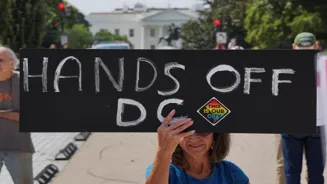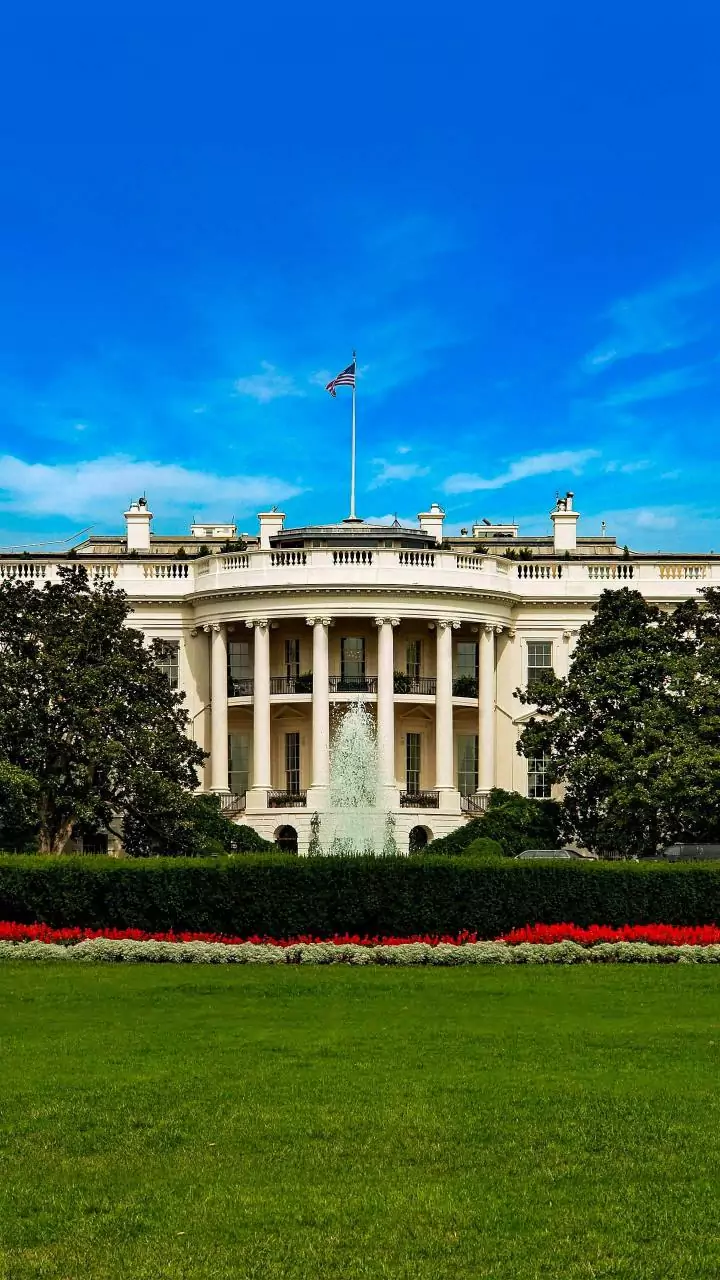What is the story about?
US President Donald Trump said on Wednesday that he would ask Congress for "long-term" control over the country's capital, Washington, DC, police department, raising concerns over the rising crime rate in the city. He went on to signal that he expects other Democratic-led cities to change their laws in response to his deployment of national guard troops and federal agents into the capital.
The remarks from the president came as the White House took credit for dozens of arrests overnight in Washington as part of Trump’s campaign to fight a “crime crisis”, which the city’s leaders say does not exist. Earlier this week, Trump invoked a never-before-used clause of the law that outlines the federal district’s governance structure to take temporary control of the police department.
However, Trump would require approval from the US Congress to extend his control beyond 30 days, which is allowed in the statute. “We’re going to need a crime bill that we’re going to be putting in, and it’s going to pertain initially to DC,” Trump said during a visit to the Kennedy Centre performing arts venue in Washington.
“We’re going to use it as a very positive example, and we’re going to be asking for extensions on that, long-term extensions, because you can’t have 30 days," he added.
While speaking to reporters at the centre, Trump said that he is expected to propose the legislation “very quickly”, though the Senate and House of Representatives are out of session and not scheduled to return until 2 September. The American leader also alluded to other options for extending control of the police department in several cities, saying, “If it’s a national emergency, we can do it without Congress”.
Trump's comments on the matter came after National Guard troops appeared on the National Mall on Tuesday evening, as officers from the FBI, Drug Enforcement Administration, Department of Homeland Security and other federal agencies appeared in neighbourhoods across the city.
Videos circulating online showed local police and federal agents arresting at least one person that evening in Columbia Heights, home to the city’s largest Hispanic population. Other videos showed traffic stops near Kennedy Street in north-west Washington, which in years past has been the site of gang activity.
The White House argued that the move was necessary to fight what Trump has described as an “out of control” crime problem in the nation’s capital. However, the city government have disputed such characterisation. Data shows that crime rates plunged last year to the lowest levels in three decades, though the capital does have higher rates of some violent crimes compared with cities with similar populations.
Trump ordered federal officers to be deployed in the capital after a staffer from the so-called “
Department of Government Efficiency” was attacked early in the morning in an upscale entertainment district. The White House maintained that 43 arrests were made on Tuesday, twice the total of the previous evening.
It was unclear how much more that was than a typical night. A spokesperson for the Metropolitan police department said a total of 76 arrests were made throughout the day citywide on Tuesday; the agency’s data showed they made an average of 56 arrests per day in 2024, The Guardian reported.
It is pertinent to note that more than 1,450 officers were deployed in the country's capital, about half of whom were from the city’s police department, while only 30 national guard troops were deployed, of the roughly 800 who defence officials have said are expected to arrive for the mission.
A White House official said to expect a “significantly higher” presence of national guard troops over the days to come, as well as round-the-clock patrols by federal agents, which have thus far only been present in the evenings. Meanwhile, Democratic lawmakers have condemned Trump’s incursion as an authoritarian move intended to distract his supporters from the Epstein scandal.
The remarks from the president came as the White House took credit for dozens of arrests overnight in Washington as part of Trump’s campaign to fight a “crime crisis”, which the city’s leaders say does not exist. Earlier this week, Trump invoked a never-before-used clause of the law that outlines the federal district’s governance structure to take temporary control of the police department.
However, Trump would require approval from the US Congress to extend his control beyond 30 days, which is allowed in the statute. “We’re going to need a crime bill that we’re going to be putting in, and it’s going to pertain initially to DC,” Trump said during a visit to the Kennedy Centre performing arts venue in Washington.
“We’re going to use it as a very positive example, and we’re going to be asking for extensions on that, long-term extensions, because you can’t have 30 days," he added.
Trump has other options
While speaking to reporters at the centre, Trump said that he is expected to propose the legislation “very quickly”, though the Senate and House of Representatives are out of session and not scheduled to return until 2 September. The American leader also alluded to other options for extending control of the police department in several cities, saying, “If it’s a national emergency, we can do it without Congress”.
Trump's comments on the matter came after National Guard troops appeared on the National Mall on Tuesday evening, as officers from the FBI, Drug Enforcement Administration, Department of Homeland Security and other federal agencies appeared in neighbourhoods across the city.
Videos circulating online showed local police and federal agents arresting at least one person that evening in Columbia Heights, home to the city’s largest Hispanic population. Other videos showed traffic stops near Kennedy Street in north-west Washington, which in years past has been the site of gang activity.
The White House argued that the move was necessary to fight what Trump has described as an “out of control” crime problem in the nation’s capital. However, the city government have disputed such characterisation. Data shows that crime rates plunged last year to the lowest levels in three decades, though the capital does have higher rates of some violent crimes compared with cities with similar populations.
The DOGE effect
Trump ordered federal officers to be deployed in the capital after a staffer from the so-called “
It was unclear how much more that was than a typical night. A spokesperson for the Metropolitan police department said a total of 76 arrests were made throughout the day citywide on Tuesday; the agency’s data showed they made an average of 56 arrests per day in 2024, The Guardian reported.
It is pertinent to note that more than 1,450 officers were deployed in the country's capital, about half of whom were from the city’s police department, while only 30 national guard troops were deployed, of the roughly 800 who defence officials have said are expected to arrive for the mission.
A White House official said to expect a “significantly higher” presence of national guard troops over the days to come, as well as round-the-clock patrols by federal agents, which have thus far only been present in the evenings. Meanwhile, Democratic lawmakers have condemned Trump’s incursion as an authoritarian move intended to distract his supporters from the Epstein scandal.





















